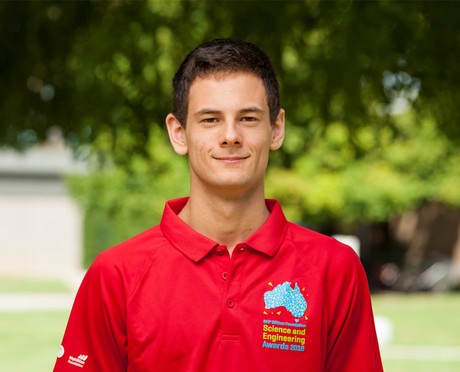Aussie student's robotic window cleaner wins Intel ISEF award

Sydney high school student Oliver Nicholls has been awarded the Gordon E. Moore Award for his fully autonomous robotic window cleaner at the Intel International Science and Engineering Fair (Intel ISEF) in Pittsburgh, Pennsylvania.
The 19-year-old from Barker College took home US$75,000 for his invention, which is designed to reduce human injury and decrease the costs of window cleaning on medium-rise commercial buildings. The small robotic device uses drones, motors and propellers to navigate building facades and clean windows using water and microfibre scrubbers.
He said his inspiration came from two health and safety events that occurred at around the same time — someone had fallen off a glass pane they were cleaning, and there was a collapse of a gantry in the city. Nicholls then questioned why these tasks can’t be automated to prevent a person from doing a dangerous activity, leading to the development of the robotic window cleaner. The final product went through rigorous prototyping, testing and evaluation to show commercial viability.
Nicholls was one of five of Australia’s 2018 BHP Billiton Foundation Science and Engineering Awards finalists to secure awards at Intel ISEF, the world’s largest international pre-college science competition. Up against over 1800 high school students from 75 countries, they collectively won a total of 11 major awards.
The award finalists attended Intel ISEF as part of the BHP Billiton Foundation Science and Engineering Awards Australian delegation and STANSW’s Young Scientist delegation. CSIRO Education and Outreach Director Mary Mulcahy said this was another example of Australia’s scientific capabilities being recognised on the global stage.
“Australia is one of the best places in the world to start a career in science, technology, engineering and mathematics (STEM). By having our high school students winning international awards, we are further strengthening our international reputation as an innovative country.”
BHP Billiton Foundation Executive Director James Ensor said seeing Australian high school students winning at an international level would inspire others to pursue independent research projects.
“Studying STEM topics fosters innovative thinking and problem-solving abilities that will help to address sustainable development challenges,” he said.
“We believe that by supporting STEM education and achievement in young people, we are investing in Australia’s future problem-solvers.”
Nicholls’s invention also took first place and Best in Category in the Physical Sciences Robotics and Intelligent Machines category, secured the IEEE Foundation Second Place Award, and received the National Aeronautics and Space Administration Second Award of US$750.
Other BHP Billiton Foundation Science and Engineering Awards winners at Intel ISEF included:
- Angelina Arora from NSW, who won fourth place in the Physical Sciences, Environmental Engineering category for her shrimp shell bioplastics;
- Caitlin Roberts from Tasmania, who won third place in the Life Sciences, Biomedical Sciences category for her project on the protease inhibiting effect of almonds; and
- Jade Moxey and Macinley Butson from NSW, who won third place in the Physical Sciences, Environmental Engineering category for their sanitation and sterilisation system.
New safety shutdown control system installed at the OPAL reactor
The ANSTO engineering and project team recently installed a new safety shutdown instrumentation...
exida component reliability handbooks available
exida has announced that its Component Reliability Database (CRD) Handbook is now available to...
LAPP Australia partners with Wieland Electric
LAPP Australia has announced it is expanding its range of electrical automation technologies...








